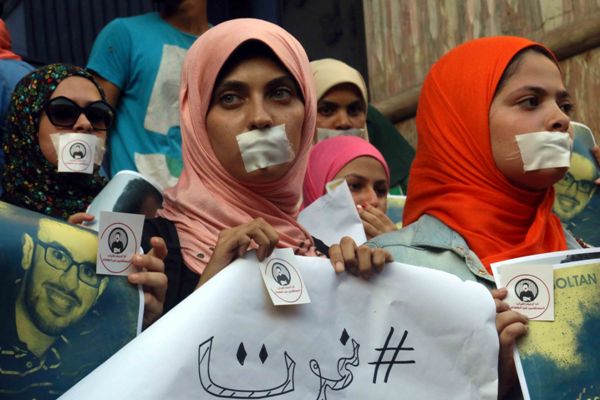Latest NEWS
- Aswat Masriya, the last word
- Roundup of Egypt's press headlines on March 15, 2017
- Roundup of Egypt's press headlines on March 14, 2017
- Former Egyptian President Hosni Mubarak to be released: lawyer
- Roundup of Egypt's press headlines on March 13, 2017
- Egypt's capital set to grow by half a million in 2017
- Egypt's wheat reserves to double with start of harvest -supply min
- Roundup of Egypt's press headlines on March 12, 2017
No hunger-strikers in Egypt's prisons: Head of Prison Investigations

Protest outside the Press Syndicate in support of imprisoned activists who are on a hunger strike, on August 25, 2014 - Emad Ahmed - Aswat Masriya
CAIRO, Sept 8 (Aswat Masriya) - Egypt's Head of the Prison Investigations, General Mohamed Ali Hussein denied Monday having any hunger-striking prisoners in all Egyptian prisons.
In a phone interview with Aswat Masriya, Hussein was asked about hunger-striking activists Ahmed Douma, Alaa AbdelFattah and his sister Sanaa, who announced going on hunger strike until their release late August.
"All these people eat and drink regularly everyday," he replied, "had they been on hunger-strike, they would have died a long time ago."
Political activist and member of "Freedom for the Brave" movement, Khaled AbdelHamid described General Hussein's words as "completely unfounded", referring to the National Council for Human Rights (NCHR) report on their visit to Douma, Abdelfattah, and Abdelrahman "Nouby" last week.
The NCHR had called for allowing hunger-strike activists Ahmed Douma and Mohamed AbdelRahman "Nouby" medical supervision at an external hospital following the deterioration of their medical condition on September 5.
The council demanded the transfer of Nouby to an outside hospital and placing him under close medical supervision, warning that he might slip into coma. It demanded gastroscopy and medical tests for Douma, also at an external hospital.
"There is no such thing as a person dying of hunger-strike," Abdelhamid said in a phone interview with Aswat Masriya, adding that "humans can endure food abstention for long periods of time."
"The brain can adapt to food deprivation through the use of ketone bodies as an alternative source of energy, allowing the person to remain deprived of food for weeks and possibly months," El Nadeem Center for Rehabilitation of Victims of Violence stated in a report.
The Freedom for the Brave, a movement calling for the release of those detained pending politically-motivated charges, announced on Sunday a gradual hunger strike campaign.
The movement described hunger strikes as "the only way" to show solidarity with detainees and support their "legitimate" demands.










